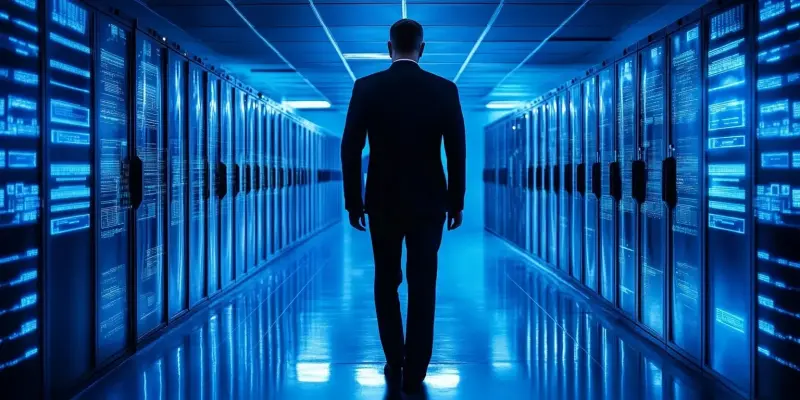The recent removal of Gen. Timothy D. Haugh from his dual roles as the director of the National Security Agency (NSA) and the head of U.S. Cyber Command has raised significant concerns about the stability and future of U.S. cybersecurity operations.Gen. Haugh’s sudden departure has come at a time when the nation’s cyber defense strategies are facing unprecedented threats and challenges, prompting many to question the rationale behind this significant leadership change.
The Importance of Gen. Haugh’s Role
Gen. Haugh played a pivotal role in overseeing the protection of the nation’s cyber infrastructure. His career was marked by his ascension through critical positions, including deputy commander of Cyber Command and commander of the Cyber National Mission Force. These roles cultivated his expertise and cemented his importance in guiding U.S. cybersecurity measures.Under his leadership, Cyber Command developed a range of strategies aimed at countering sophisticated cyber threats, thus ensuring robust cyber defenses.
Haugh’s leadership was integral in addressing and mitigating diverse cyber threats from state actors and criminal organizations. He was a central figure in crafting initiatives to protect Department of Defense networks and oversee offensive operations to neutralize potential adversaries.The cumulative experience Haugh brought was critical in maintaining resilience against cyberattacks, prompting concerns over the impact his removal could have on the nation’s cyber defense readiness. Notably, the continuity of such an experienced leader is essential for maintaining a strong strategic response in the cyberspace domain.
Implications of Leadership Changes in Cybersecurity
The abrupt leadership change occurs amidst heightened job cuts and organizational uncertainty within key cybersecurity agencies. This upheaval has sparked legitimate concerns regarding the potential vulnerabilities that could arise as these agencies, including the Cybersecurity and Infrastructure Security Agency (CISA) and the National Institute of Standards and Technology (NIST), face operational disruptions.Stability within these agencies is paramount to ensure a synchronized and robust response to cyber threats, especially in an era where cyberattacks are becoming increasingly frequent and sophisticated.
The disruption caused by Gen. Haugh’s departure does not just present a temporary gap in leadership; it could lead to a profound impact on the strategic capabilities and operational readiness of the U.S. cyber defense framework. The flux may hinder collaborative efforts between agencies, potentially slowing down response times and leaving critical infrastructure more vulnerable to attacks. Moreover, the leadership turmoil within these cybersecurity bodies could weaken overall defenses at a time when cohesive strategies are most needed to counteract escalating cyber aggressions from adversarial entities.
Response from Capitol Hill and Security Experts
Lawmakers and security professionals have been vocal in expressing their alarm over the unexpected firing of Gen. Haugh. Figures such as Sen. Mark Warner of Virginia and Rep. Jim Himes of Connecticut have underscored the critical importance of experienced leadership in safeguarding national security.Warner pointed to the increasing complexity of cyber threats, citing specific incidents like the Salt Typhoon cyberattack from China, as evidence of the need for knowledgeable and steady leadership. His objections to Haugh’s dismissal reflect a broader concern that such a decision undermines the security apparatus at a critical juncture.Rep. Himes echoed these concerns, emphasizing the importance of transparency and the potential detriment to national security stemming from Haugh’s removal. He highlighted Haugh’s integrity and dedication to national defense, suggesting that his dismissal might reflect deeper, possibly political, motivations.Calls from Capitol Hill stress the necessity for an unequivocal explanation for the sudden decision, urging that without a clear rationale, public trust and confidence in the nation’s cyber defense leadership could be severely compromised. Trust and stability are vital for effective cybersecurity operations, and this unexpected firing has thrown these elements into disarray.
The Appointment of New Leadership
In the wake of Gen. Haugh’s firing, Lt. Gen. William J. Hartman and Ms. Sheila Thomas have been swiftly appointed to serve as the acting director of the NSA and acting commander of Cyber Command, respectively.This rapid appointment signals an urgent effort to maintain continuity within the agency, considering the critical nature of the roles both officials have assumed. However, while Hartman and Thomas bring their own skills and expertise to the table, the absence of clear communication regarding Haugh’s removal has only fueled speculation and unease.The lack of transparency surrounding the decision has amplified demands for the NSA and Department of Defense (DoD) to clarify the circumstances leading to Haugh’s departure. Security experts argue that the justification for such a significant change must be communicated to ensure ongoing diligence and accountability within these crucial institutions. Hartman and Thomas face the dual challenge of stepping into their new roles amid heightened scrutiny and proving that the strategic objectives and operational integrity of U.S. cybersecurity initiatives remain intact, despite the leadership upheaval.
Ensuring Future Stability in U.S. Cybersecurity
The recent removal of Gen. Timothy D. Haugh from his roles as the director of the National Security Agency (NSA) and the head of U.S. Cyber Command has sparked significant concerns regarding the stability and future of U.S. cybersecurity operations. Gen. Haugh’s abrupt departure occurs amidst a period when the nation’s cyber defense strategies are encountering unparalleled threats and challenges.Many experts and officials are questioning the rationale behind this major shift in leadership, particularly as cybersecurity threats from adversaries, including state actors and independent hackers, are escalating. The timing of this leadership change is particularly puzzling given the critical importance of consistent and stable leadership in these pivotal roles.The NSA and U.S. Cyber Command play essential parts in safeguarding the nation’s cyber infrastructure, and Haugh’s experience and expertise were seen as critical assets. This unexpected move raises questions about how the U.S. will continue to defend against increasingly sophisticated cyber threats without his leadership.

